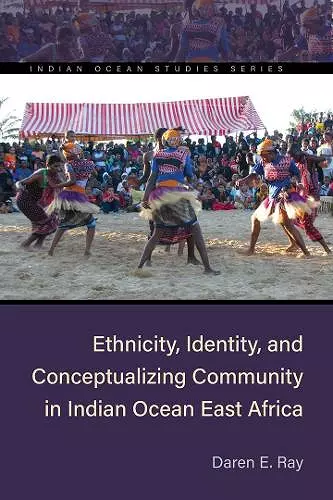Ethnicity, Identity, and Conceptualizing Community in Indian Ocean East Africa
Format:Paperback
Publisher:Ohio University Press
Published:28th Nov '23
Should be back in stock very soon

This volume explores how the people of littoral East Africa imagined and reimagined their communities over two millennia of engagement with Indian Ocean transformations-from the settlement of Bantu speakers near the coast around the first century CE to their participation in transoceanic commerce, imperial rivalries, colonial projects, and decolonization movements in the mid-twentieth century. Like other histories of the Indian Ocean, it emphasizes the circulation of people and ideas, but its cis-oceanic approach demonstrates how these littoral communities continued to integrate strategies from those in Africa’s interior as well as from people who traveled the ocean.
The book also clarifies the precise relationship between ethnicity and other kinds of identities by expanding the conventional focus on Swahili people to speakers of Sabaki Bantu languages, as well as to Mijikenda, Pokomo, and Elwana communities, whom Indian Ocean scholars often overlook. By examining all these groups’ shared linguistic heritage, the book outlines their forebears’ innovation and transformation of lineages, clans, confederations, councils, title societies, age sets, moieties, religious sects, and tribes. Drawing together evidence from linguistics, archaeology, ethnography, oral traditions, travelers’ accounts, and colonial records, the book explores how the speakers of Sabaki languages continuously reconceptualized their identities in littoral East Africa as the political topography of the Indian Ocean world changed around them.
Moving seamlessly across multiple precolonial and colonial eras and beyond, this deep history of collaboration and political imagination leads readers through the transitions of identity that mattered to littoral East Africans. The book fills the need for an updated synthesis of East Africans’ engagements with diasporic communities in Indian Ocean and world history courses. In addition, since most African history publications for classroom use in recent years have focused exclusively on modern times, it satisfies the demand for works that span the early and modern eras.
Beyond the classroom, the book will interest specialists in the history of the Indian Ocean, Africa, Islam, imperialism, and ethnohistory. A major contribution of this multidisciplinary work is to present the research of archaeologists, anthropologists, linguists, and historians to one another in an accessible, jargon-free manner. While Africanists will appreciate how the book expands the boundaries of the Indian Ocean to include oft-ignored communities, Indian Ocean specialists will find models for investigating the construction of ethnicity and other collective identities across multiple centuries.
A fascinating, thought-provoking, genre-bending study. This book charts new territory for Indian Ocean and East African Studies, incorporating influences from both land and sea across time, while centering vernacular cultures and politics. A ground-breaking reconceptualization of not only ethnicity, but also kinship, Islamization, urbanization, and the oceanic. - Bettina Ng'weno, University of California, Davis Daren E. Ray’s history of Kenyan coastal identities ranges over two millennia through changing social formations using a community-centered approach. His work is exemplary cross-disciplinary scholarship, featuring deft use of archaeological, linguistic, and ethnographic data as well as oral and written sources. A mosaic of words, objects, and experiences illuminates nested identities, all in motion in the East African and Indian Ocean worlds. An engaging narrative from start to finish, this book will be welcomed across many fields of inquiry and in a wide range of classrooms. - Adria LaViolette, University of Virginia An impressive work of detailed and meticulous scholarship that is unreservedly recommended as a core addition to personal, community, and college/university library East African history collections and supplemental linquistics and Black studies curriculum lists. (Midwest Book Review) Through incorporating insights from numerous methodological modalities, Ray pieces together an impressively longue-durée history of community identity formation, of ethnicity and its cultural ancestors, and of the ways that the peoples of the coast interacted with and depended upon each other. Ray’s work speaks meaningfully to historiographies of ethnicity in Africa and to the smaller historiography of ethnicity in the Indian Ocean. It disrupts contemporary assumptions about the history of “Swahili towns” and about the shared histories of Mijikenda and Swahili ethnic identities. The cis-oceanic approach makes a very useful critique of the ways that local littoral concerns, motives, identities, and sociopolitical structures are sometimes glossed over in transoceanic histories of the Indian Ocean. Ultimately, this book is successful in its stated goals, and it adds some much-needed time depth to the history of the East African littoral. (H-Africa / H-Net Reviews)
This volume makes an important contribution to history and social science in southeastern Kenya while challenging problematic dichotomies and mummified identities on the continent. Ray’s text will interest anthropologists, historians, political scientists, and Africanists in general, as well as those who want to learn more about similar dynamics and related communities in Tanzania.
(Tanzanian Affairs) Recommended. (Choice)ISBN: 9780821426135
Dimensions: unknown
Weight: unknown
312 pages